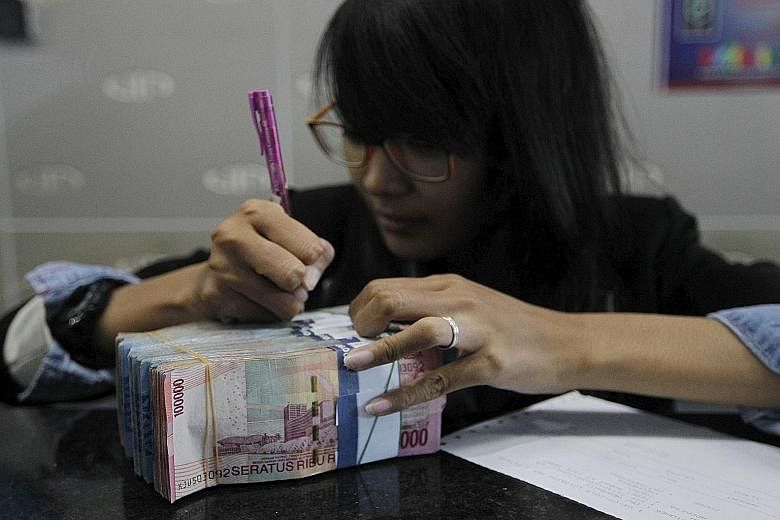JAKARTA • Rocked by a political scandal and falling oil prices, Malaysia has been dominating headlines in recent months as the country's ringgit leads a drop in Asian currencies.
That has taken the spotlight off the economy of neighbouring Indonesia, which Standard & Poor's (S&P) says is more exposed to capital flight.
"The thing about Malaysia is that the capital market is deeper there, so there's less reliance on foreign capital among corporates or banks to fund their growth," said Mr Kyran Curry, S&P's director of sovereign ratings in Singapore. "Indonesia is much more vulnerable to shifts in outflows and inflows. We're worried about Indonesia's foreign-exchange reserves."
Bank Indonesia's reserves have fallen almost 7 per cent in the five months though July.
While that is less than Malaysia's fall, Mr Curry says he is concerned as the monetary authority in Jakarta has recently been "spending a lot to stabilise volatility in the currency".
The rupiah has weakened 4.9 per cent since the end of July, less than half the 11 per cent slide in the ringgit, as China's devaluation of the yuan spurred depreciation in the region.
Indonesian stocks and local-currency sovereign bonds have fallen faster than Malaysia's over the last three months, even though the latter country, a net oil exporter, has been hurt more by the falling price of Brent crude and allegations of corruption against Prime Minister Najib Razak.
The government in Jakarta has been buying back its own sovereign bonds and encouraging state-owned companies to purchase their shares to stem declines.
"The government is doing things and the central bank is working to try and deepen the local capital market but it's taking a long time to develop," said Mr Curry. "The capital market in Malaysia is much larger and deeper."
Indonesia's benchmark stock gauge lost 15 per cent over the past three months, compared with a 10 per cent drop in Malaysia.
The two countries' local-currency bonds are the only decliners in Asia over the period. Malaysia's have dropped 0.7 per cent and Indonesia's have fallen 1 per cent, according to Bloomberg indexes.
Foreign funds have pulled US$467 million (S$665.3 million) from Indonesian shares this year after pumping a net US$3.8 billion into the securities in 2014, exchange data shows.
Some RM16.4 billion (S$5.4 billion) has been taken out of Malaysian stocks this year, following RM6.9 billion of outflows last year.
With the highest yields in emerging-market Asia, Indonesia's local- currency sovereign bonds are popular with overseas investors, who own almost 38 per cent of them.
The ratio in Malaysia is 32 per cent, according to data compiled by Bloomberg.
"Malaysia never had the massive inflows that Indonesia had over the course of the last few years," said S&P's Mr Curry.
Neither Indonesia nor Malaysia's credit ratings are under any immediate threat, he said.
S&P is the only one of the three big rating companies that does not rank Indonesia as investment grade, assigning the country its top junk rating of BB+.
It assesses Malaysia four levels higher at A- with a stable outlook.
Indonesia's outlook could be changed to stable from positive if macroeconomic imbalances arise or if the current administration's reform push wanes, Mr Curry said.
Malaysia recorded a current account surplus of US$1.8 billion in the second quarter at the current exchange rate, while Indonesia posted a deficit of US$4.48 billion, official data shows.
BLOOMBERG

